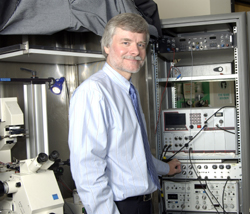Within a national plan to confront to Diabetes in UAE: Sheikh Hamdan Bin Rashid Award for Medical Sciences monitors the mechanism underlies cardiac muscle dysfunction in Diabetic Heart
26 December 2011
Within a national plan to confront to Diabetes in UAE: Sheikh Hamdan Bin Rashid Award for Medical Sciences monitors the mechanism underlies cardiac muscle dysfunction in Diabetic Heart
Within a framework of a national plan adopted by all institutions and health authorities in UAE with the aim of confronting to the spread of Diabetes, Sheikh Hamdan Bin Rashid Al Maktoum Award for Medical Sciences has funded the scientific research on monitoring early changes in pattern of gene expression which is associated with ventricular myocyte dysfunction and alerted mechanisms of Ca2+ signaling in young type 2 Zucker diabetic fatty rat heart.
"It is essential to understand the mechanisms that underlie cardiac muscle dysfunction in type II diabetic heart, which would allow new therapeutic strategies and early intervention", Prof. Chris Howarth, Department of Physiology, Faculty of Medicine and Health Sciences, UAE University, said.
Professor Howarth said that the research is a part of a group of research papers he carried out during the last ten years focusing on the relationship between diabetes and heart function.
"Diabetes mellitus is a global health problem and is of particular importance in the region and in the UAE. Cardiovascular problems are the major cause of morbidity and mortality in diabetic patients. Diabetes is associated with a variety of complications including heart complications. The nature of the complications depends, among other factors, on the severity and duration of Diabetes", Prof. Howarth said.
He said that, through a one year – research, he compared among the functions of 30 genes which are linked to cardiac muscle functions divided into 3 groups: genes for cardiac muscle protein and associated regulatory protein, genes related to cell membrane ion transport and genes related to intracellular Ca2+ transport and Ca2+ regulation.
"The experiments were conducted on two groups of hearts. The first group was for Non-Infected Rats, and the second group was for type 2 Zucker Diabetic Fatty Rats. Approval for this project was obtained from the Animal Ethics Committee, Faculty of Medicine and Health Sciences, UAE University", he added.
Prof. Howarth, the winner of Sheikh Hamdan Award for original research paper published in journal of Medical Sciences from inside and outside UAE in 2002, praised the prestigious Sheikh Hamdan Bin Rashid Al Maktoum Award for Medical Sciences for supporting medical research within the UAE.
On the other hand Prof. Najeeb Al Khaja, Cardiac Surgeon and Secretary General of Sheikh Hamdan Bin Rashid Al Maktoum Award for Medical Sciences said that he is so proud of supporting the research by the Award, as it is considered an important basic research paper that allow deeper understanding for type II diabetes and its impact on cardiac diseases, which lay basis for further research contributing to the development of future means of preventive, diagnostic and therapeutic strategies.
"Diabetes is a global health problem, spreads significantly in the United Arab Emirates. In the past, type II of Diabetes affected people with age more than forty, but now it affects young people and children. There is a need for more research for a better understanding of the dynamics of the disease progression and the way it affects vital functions in human bodies", Al Khaja said.
"Sheikh Hamdan Bin Rashid Al Maktoum Award for Medical Sciences has developed a long-term plan to confront to diabetes through funding a distinguished group of high quality scientific research on diabetes within UAE", he added.
"Efforts of UAE Ministry of Health and health authorities must be combined together with efforts of all other ministries and non-governmental organizations through adopting a National Awareness Program with the aim of promoting preventive strategies directed to all segments of the society", Al-Khaja stressed.
Al-Khaja also encouraged the Arab young scientists to give more concern to scientific research, and not to depend on the results of the ready-made imported scientific research which are difficult to be accurately applied on Arabs.
"Scientists all over UAE are called to submit their research projects to the award’s medical research support and community service centre, not later than the end of the current month. Obtaining the award’s financial support depends on the quality of presented papers and its applicability on the ground. In each term of the award, AED 2 million are allocated for medical research grants", Al Khaja said.

